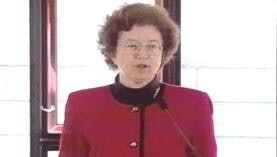 Judge Karen Nelson Moore dissented in the Miami University suit, saying that the case merits a jury trial.
Judge Karen Nelson Moore dissented in the Miami University suit, saying that the case merits a jury trial.A divided federal appeals court has let stand a ruling in favor of Ohio’s Miami University in a racial discrimination suit by a Black engineering faculty member who failed to win tenure.
By a 2-1 vote, the 6th Circuit U.S. Court of Appeals refused to reinstate the suit filed by Dr. Marvin Thrash, who joined the Department of Paper Science and Engineering as an opportunity hire in 2004.
For Thrash’s first four annual reports from the department’s promotion and tenure committee criticized him for having too few peer-reviewed journal articles and lack of external funding, the decision said. His fifth-year reviews were better, praising him for an improved record of publications.
When he applied for tenure, Thrash proposed the names of external reviewers. However, conflicts arose between him and the chair of his department, who alleged said he would not select any HBCU faculty members as reviewers.
Even so, four of the six reviewers who were ultimately chosen were African-American, the decision said. Four reviewers recommended tenure and the other two made no recommendation either way and reached opposite conclusions about the quality and originality of his research.
The department committee recommended tenure but the chair disagreed, saying Thrash failed to establish a “robust research program.” The dean and the university promotion and tenure committee sided with the chair.
Thrash filed a Title VII employment discrimination suit that was dismissed without trial.
The appeals court majority upheld that decision in an opinion by Judge Richard Griffin.
The court rejected Thrash’s assertion that the department chair “devalued African-American scholars generally and Dr. Thrash specifically,” saying the chair had approved a majority of Black reviewers and had rejected a Chinese reviewer, not because she was from an HBCU but because her university had no PhD program.
Next, the court found insufficient evidence that the university treated two non-Black faculty members more favorably.
And it expressed reluctance to “perform a substantive evaluation” of Thrash’s academic record. “We are neither engineers nor scientists, and as such are ill-suited to evaluate the quality of Dr. Thrash’s work ourselves,” the court continued, adding that tenure decisions “are generally entitled to more deference than employment decisions in other settings.”
In a dissent, Judge Karen Nelson Moore said the case merits a jury trial and criticized the majority for failing to give enough weight to the evidence Thrash produced.
Workplace Not Hostile
Two isolated comments with arguably derogatory ethnic meaning are insufficient to create a hostile workplace, a federal judge has ruled in a retaliation suit by the Italian-American former director of labor relations at the University of Chicago.
The comments by two African-American women came about a month apart.
U.S. District Judge John Nordberg dismissed the suit filed by John Panico, an attorney with more than 25 years of labor law experience.
The university hired Panico in 2010. He resigned about a year later.
According to the decision, Panico claimed that an attendee at a labor relations training program for manager asked him “if he was going to do the `Guido’ thing,” a remark he considered an offensive ethnic slur. He complained to the university’s director of employee relations, who was Black, and she concluded that the manager hadn’t known the word was offensive.
A month later in a one-on-one meeting, Panico’s supervisor “made a passing reference to `crackers’ when referring to Caucasians” living in South Carolina. Panico met with the White associate provost who conducted an investigation and concluded that the remark was not derogatory or discriminatory.
He resigned a week later. Six month after that, he inquired about returning to the University of Chicago in his former position or a similar job but was turned down. After another 10 months, he applied for labor relations openings at the university and its medical center, again unsuccessfully.
Panico then filed EEOC charges and sued under Title VII, asserting that his resignation was due to a hostile environment created by the two comments.
In dismissing the suit, Nordberg agreed with the university that the two comments “do not rise to the high level needed to create a hostile environment.
The “Guido” comment “seems more directed at behavior rather than national origin,” Nordberg said, and the word “cracker” was a passing remark at a private meeting and not directed at Panico.
The decision also noted that Panico had filed a similar employment retaliation lawsuit against a Florida hospital where he was hired a few weeks after quitting the University of Chicago. That suit accused the hospital of terminating him in retaliation for reporting malfeasance by workers and union representatives. There, too, he had unsuccessfully reapplied for a job before suing.
Suit Can Continue
A dean’s remarks that allegedly displayed gender bias were sufficient to allow a female ex-faculty member to continue her sex discrimination suit against the University of the Pacific, according to a federal judge in California.
U.S. District Judge Troy Nunley rejected the university’s request to throw out Dr. Utha Hellmann-Blumberg’s suit alleging discrimination in denial of her promotion and tenure.
The university hired Hellmann-Blumberg as a tenure track assistant professor of chemistry in 2001. The departmental committee voted in favor of her application and the chair initially supported it but later changed her recommendation, the decision said. Interim Dean Robert Cox recommended against tenure, the president turned down the application and she was terminated in 2008.
Asserting that she met the qualifications for tenure under the university’s guidelines and g, she sued under federal and California law. She claimed two male professors were granted tenure although they had the same number or fewer publications than she did.
In his decision, Nunley said one of the two men was not similarly situated because his tenure decision was made under an older version of the standards.
The other male colleague, however, was evaluated under the same standards as Hellman-Blumberg, and like her, had published only one paper while at the university. The university emphasized that the male colleague had received numerous grants.
Nunley relied on Hellmann-Blumberg’s claim that Cox “has a history of gender bias,” an assertion supported by testimony from a male faculty member. Thus, he said a trial is necessary to resolve “whether Cox’s evaluation of her application was based on her qualifications alone or influenced by a bias toward her gender.”
Nunley also said that although the president stated that he had independently determined that Hellmann-Blumberg didn’t meet tenure requirements, “his statement that Cox is `a person of high integrity’ reflects that the president strongly considered Cox’s recommendation.”


















